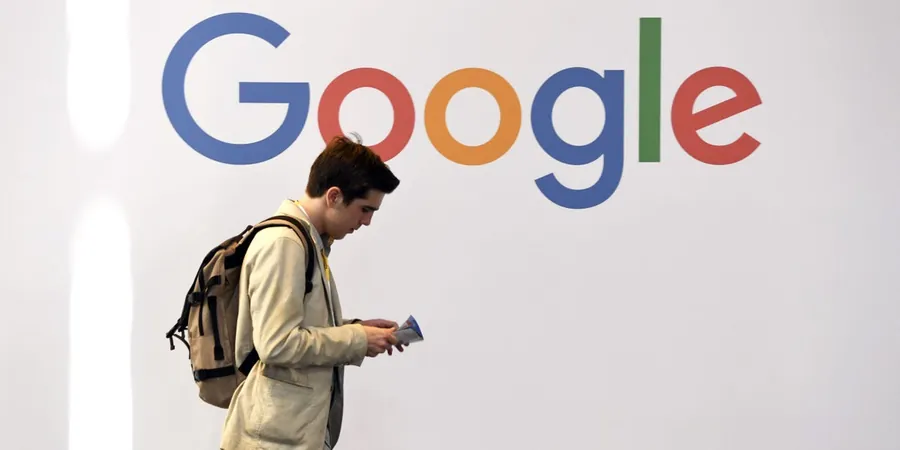
Landmark Ruling: Google Must Open Android to Rival App Stores, Signaling Major Shift in Antitrust Law
2024-10-09
Author: Kai
Landmark Ruling on Google and Android
In a groundbreaking decision, a California judge ruled on Monday that Google must allow rival third-party app stores to operate on its Android platform, a significant development in the ongoing antitrust battle between the tech giant and Fortnite developer Epic Games.
The verdict stands in stark contrast to a previous ruling involving Apple, which largely favored the tech giant in 2021. Experts believe this latest ruling could result in substantial financial repercussions for Google, potentially costing the company billions in lost revenue as competitors gain a foothold in the app market.
Origins of the Case
The origins of the case date back to August 2020 when Epic Games accused Google of monopolistic practices in its Play Store. After a lengthy legal tussle, a jury concluded that Google manipulated its Play Store policies to limit the visibility and reach of competing apps, inflating prices for in-app purchases in the process. Judge James Donato's ruling sets forth specific remedies to curb Google's monopolistic behavior, barring the company from paying developers for exclusive rights to launch apps on its platform or for preinstalling its app store on devices—for a duration of three years.
Financial Implications
Associate Professor Peter Cohan from Babson College suggests that this ruling could have dire financial implications for Google. "We’re looking at potential losses of tens of billions in revenue over the next few years," he stated. "This decision reflects a broader shift in government strategy to counteract the excessive pricing power of dominant tech companies."
Evolution of Antitrust Law
The ruling also opens up discussions on how antitrust law has evolved in the United States. Professor Eric Chaffee from Case Western Reserve University pointed out that previously, judges viewed antitrust cases through a more political lens, often favoring liberal interpretations. Now, even more conservative justices are re-evaluating the notion of breaking up monopolistic practices, particularly within the tech sector.
Google's Response and Concerns
As the dust settles on this latest ruling, Google has expressed its intention to appeal, citing concerns over user safety and a consistent experience across its platform. A company representative emphasized that "the Epic verdict missed the obvious: Apple and Android clearly compete." They contend that the ruling could inadvertently weaken competition within the market, especially against Apple.
Skepticism About the Ruling's Impact
Alden Abbott, former General Counsel for the FTC, shares skepticism about whether this injunction will ultimately benefit consumers, suggesting that it might stifle competition rather than foster it. He remarked, "Preventing Google from securing exclusive deals may undermine competition with Apple and deter third-party developers from creating quality games, ultimately harming consumers."
A Celebration from Epic Games
In a notable twist, Epic Games' CEO Tim Sweeney celebrated the ruling on social media, emphasizing the opportunity it presents for developers and manufacturers to create a more competitive Android ecosystem. "This means all app developers, store makers, carriers, and manufacturers have three years to build a vibrant and competitive Android ecosystem with such critical mass that Google can't stop it,” Sweeney wrote.
Conclusion and Future Implications
As Google now prepares for a lengthy appeals process, this case represents a significant turning point in the ongoing scrutiny of Big Tech and could reshape the landscape of app distribution in the coming years. This ruling may just be the beginning of a larger reevaluation of tech giants' power and practices in a rapidly evolving digital marketplace. Will other Big Tech companies face similar challenges ahead? Only time will tell.



 Brasil (PT)
Brasil (PT)
 Canada (EN)
Canada (EN)
 Chile (ES)
Chile (ES)
 España (ES)
España (ES)
 France (FR)
France (FR)
 Hong Kong (EN)
Hong Kong (EN)
 Italia (IT)
Italia (IT)
 日本 (JA)
日本 (JA)
 Magyarország (HU)
Magyarország (HU)
 Norge (NO)
Norge (NO)
 Polska (PL)
Polska (PL)
 Schweiz (DE)
Schweiz (DE)
 Singapore (EN)
Singapore (EN)
 Sverige (SV)
Sverige (SV)
 Suomi (FI)
Suomi (FI)
 Türkiye (TR)
Türkiye (TR)